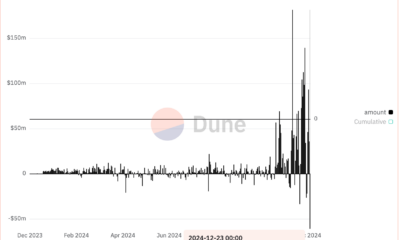Opinion
Bitcoin Won't Let You Transcend Politics
Published
2 months agoon
By
admin

#Bitcoin 'er pic.twitter.com/hGsYHMBqot
— ⚡₿itcoinTeddy⚡ (@Bitcoin_Teddy) October 7, 2024
We can’t transcend politics ‘because we have bitcoin now, bro’. Sometimes I see this kind of t-shirt or sentiment being shared online, but it’s simply misguided.
Just to prove I’m not strawmanning, here’s another similar example:
My condolences to anyone who pays attention to politicians 😅
Trust math, not politicians.
— FractalEncrypt ∞/21M (@FractalEncrypt) October 16, 2024
If you just mean “I’m not interested in politics” or you don’t like one particular party’s politics, that’s one thing, but it’s still not sufficient to secure your own liberty. As the saying goes, you may not be interested in politics, but politics is interested in you.
Zooming out a little bit here
Even if we abstract away from the upcoming US presidential election, politics more broadly is about making decisions in groups, and a reflection of power relations among individuals. We are determining who gets to control which scarce and rivalrous resources, ideally in a way that enables people to live together while reducing conflict. In a sense, Bitcoin does help reduce conflict over ownership of money, using cryptography.
But remember reality here
Now yes, we can talk about liberty, anarcho-capitalism and crypto-anarchy at a philosophical level. But the state exists today. So given this reality, if you want to secure your own political rights, it still matters to engage in some way. That could mean campaigning and contributing to bitcoin, economics and liberty focused education, it could be writing a submission to voice your opinion or lobby for a pro-bitcoin policy, it could mean being a part of a particular party, it could even mean contributing to secessionist movements and causes.
But entirely ceding the political turf to your enemies is a bad decision. In some cases, it is that the politicians are genuinely uninformed on Bitcoin, and they ‘follow it’ by seeing news headlines. In these genuinely uninformed cases, having educated Bitcoiners speaking to them, and helping them not make major mistakes will be helpful. It can reduce the risk of bad regulations or laws on bitcoin self custody, transfer, mining, node running etc. This can reduce the risk of bitcoiners being criminalised, reduce regime uncertainty, lower tax burdens or otherwise.
In other cases, there are politicians with an axe to grind about Bitcoin or Crypto, such as Elizabeth Warren with her “Anti Crypto Army”. In these cases, perhaps a more combative approach has to be taken where the community supports a pro-Bitcoin candidate instead of the anti-Bitcoin politician.
But what about cypherpunks writing code and existing in crypto-anarchy?
The late Hal Finney, Bitcoin legend and cryptography pioneer, was also libertarian and even he posted the following to a mailing list discussion (shout out to Aaron van Wirdum for surfacing this in The Genesis Book):
“I am not in cyberspace now; I am in California. I am governed by the laws of California and the United States even though I am communicating with another person, whether by postal mail or electronic mail, by telephone or TCP/IP connection. What does it mean to speak of a government in cyberspace? It is the government in physical space I fear. Its agents carry physical guns which shoot real bullets. Until I am able to live in my computer and eat electrons, I don’t see the relevance of cyberspace.”
It’s not that he was philosophically opposed to liberty or crypto-anarchy, it’s that he saw the real world limitations for what they were and are.
But wouldn’t it be nice if everyone got along? Kumbaya?
Yes there is the idealistic sense in which “Wouldn’t it be nice” or “what if we all just respected each other’s rights and ignored the state” – but the reality is that “people won’t all just”. They see a system that enables them to steal from other people or to control other people, and they will take advantage of it. This can manifest in very simple ways where politicians promise “free things” or to protect you from the boogeyman in exchange for power. Given that many voters in democracies are not net-payers into the system, of course they will not think about the long term. They will not think about the risk taken, or the effort to accumulate capital and build a business. For these selfish voters, they will just take whatever they can get here and now, and not think about the future.
Doesn’t Bitcoin Fix This?
Won’t Bitcoin fix some of these things though? Yes, it is true that the state uses cheap fiat credit and control over the money to expand itself. Yes it is true that the state undermines competing forms of private governance, such as the family, the community, even religion and private charity – in order to install itself as the more powerful government mechanism on which people depend.
As part of this process, more things are politicized, and this has taken place in most of our own lifetimes. There used to be unwritten rules about not talking politics while on a date, or in a polite social setting. That sense of decorum is now gone, and nowadays we all endure lectures about the latest ‘Current Thing’ even at non-political events.
Even in the hyperbitcoinized world, there will still be family politics about things like family business, or inheritance battles or divorce battles. Or if we have monarchies and free private city governance, there could still be politics involved. The benefit might just be that it’s easier to opt out of it, and everyday people aren’t forced to participate. So yes longer term, Bitcoin will reduce but not eliminate politics. But don’t confuse this world now, for that world later on.
If you think so much can be achieved politically, why have Bitcoin or code at all?
There’s a division of labor here. Bitcoin and writing code is absolutely essential. But my point is more that those people good at party politics should focus on that, and those people good at writing and reviewing code should focus on that.
Making the political system less hostile helps those people writing code, and it helps everyday HODLers who are holding their keys and running their node. After all, if Bitcoin and Bitcoin app code is improved, that could make it technically easier for people to use Bitcoin. In a broader political sense, writing code is reducing conflict by further reducing the cost of protecting money. It helps more people HODL and use their coins how they wish.
Summing it all up
Yes it would be nice if less people used the state to steal from each other, or control each other, but the pathway to get there does not mean you should just kneel down and take beatings from the other side. Yes it would be nice if we didn’t have to pay attention to these things, but that’s wishful thinking. Even if you personally don’t have the proverbial ‘stomach’ to wade into the swamp of political activism in favor of Bitcoin, the very least you can do is not poo-poo the efforts of those who do have the stomach for it. Likewise, the people who can do party politics or political activism should not poo-poo the efforts of those writing and reviewing code to improve Bitcoin.
Bottom line, don’t confuse the society you want, with the method of getting there.
This is a guest post by Stephan Livera. Opinions expressed are entirely their own and do not necessarily reflect those of BTC Inc or Bitcoin Magazine.
Source link
You may like


BTC Risks Falling To $20K If This Happens


Most Layer 2 solutions are still struggling with scalability


Here’s why Stellar Price Could Go Parabolic Soon


Perp-Focused HyperLiquid Experiences Record $60M in USDC Net Outflows


Experts say these 3 altcoins will rally 3,000% soon, and XRP isn’t one of them


Robert Kiyosaki Hints At Economic Depression Ahead, What It Means For BTC?
Blockchain
Most Layer 2 solutions are still struggling with scalability
Published
2 hours agoon
December 23, 2024By
admin
Disclosure: The views and opinions expressed here belong solely to the author and do not represent the views and opinions of crypto.news’ editorial.
Since pivoting to a layer 2-centric approach, the Ethereum (ETH) ecosystem has relied heavily on L2 solutions to scale. However, these solutions are struggling to compete effectively, especially under pressure from alternatives like Solana (SOL). During the recent meme coin craze, Solana attracted much of the activity due to its advantages: low fees, high transaction speed, and user-friendliness.
To understand the challenges, it’s essential to examine why L2 solutions have not demonstrated the scalability and cost advantages that were widely anticipated.
Why meme projects favor Solana over Ethereum L2s
Meme projects have significantly contributed to the recent surge in market activity. These projects favor Solana for several reasons beyond user-friendliness:
- Low fees: Solana’s low transaction costs make it ideal for fee-sensitive applications like memecoins.
- High speed: Solana’s multithreaded architecture enables high throughput, ensuring seamless user experiences.
- Better developer experience: Solana’s tools and ecosystem are optimized for ease of use, attracting developers and projects.
Why is scalability important?
Scalability is fundamentally measured by the number of transactions a blockchain can process. A highly scalable blockchain can handle more TXs while offering lower fees, making it crucial for widespread adoption and maintaining a seamless user experience.
This is especially important for grassroots projects like meme coins, many of which are short-lived and highly fee-sensitive. Without scalability, these projects cannot thrive, and users will migrate to platforms that offer better efficiency and cost-effectiveness.
Why Ethereum L2s aren’t up to the challenge
Architectural limitations of Ethereum. Ethereum has long faced scalability issues, and L2 rollups are its primary solution to these problems. L2s operate as independent blockchains that process transactions off-chain while posting transaction results and proofs back to Ethereum’s mainnet. They inherit Ethereum’s security, making them a promising scaling approach.
However, Ethereum’s original design poses inherent challenges. Ethereum’s founder, Vitalik Buterin, has admitted that “Ethereum was never designed for scalability.” One of the key limitations is the lack of multithreading in the Ethereum Virtual Machine. The EVM, which processes transactions, is strictly single-threaded, meaning it can handle only one transaction at a time. In contrast, Solana’s multithreaded architecture allows it to process multiple transactions simultaneously, significantly increasing throughput.
L2s inheriting Ethereum’s limitations. Virtually all L2 solutions inherit Ethereum’s single-threaded EVM design, which results in low efficiency. For instance, Arbitrum: With a targeted gas limit of 7 million per second and each coin transfer costing 21,000 gas, Arbitrum can handle about 333 simple transactions per second. More complex smart contract calls consume even more gas, significantly reducing capacity. Optimism: With a gas limit of 5 million per block and a block time of 2 seconds, Optimism can handle only about 119 simple transfers per second. Gas-intensive operations further reduce this capacity.
Unstable fees. Another major issue with Ethereum and its L2 solutions is unstable fees during periods of high network activity. For applications relying on low and stable fees, this is a critical drawback. Projects like meme coins are especially fee-sensitive, making Ethereum-based L2s less attractive.
Lack of interoperability between L2s. The scalability argument for having multiple L2s only holds if contracts on different L2s can interact freely. However, rollups are essentially independent blockchains, and accessing data from one rollup to another is as challenging as cross-chain communication. This lack of interoperability significantly limits the potential of L2 scalability.
What can L2s do to further scale?
Embed features to enhance interoperability. Ethereum L1 needs to do more to support interoperability among L2s. For example, the recent ERC-7786: Cross-Chain Messaging Gateway is a step in the right direction. While it doesn’t fully resolve the interoperability issue, it simplifies communication between L2s and L1, laying the groundwork for further improvements.
Architectural updates: Diverge from the existing L1 design. To compete with multithreaded blockchains like Solana, L2s must break free from Ethereum’s single-threaded EVM design and adopt parallel execution. This may require a complete overhaul of the EVM, but the potential scalability gains make it a worthwhile endeavor.
Future milestones
Ethereum’s L2 solutions face significant challenges in delivering the scalability and cost-effectiveness that applications like meme coins demand. To stay competitive, the ecosystem must address fundamental architectural limitations, enhance interoperability, and embrace innovations in blockchain design. Only by doing so can Ethereum L2s achieve the scalability needed to support widespread adoption and fend off competition from emerging blockchains like Solana.

Laurent Zhang
Laurent Zhang is the president and founder of Arcology Network, a revolutionizing Ethereum layer-2 solution with the first-ever EVM-equivalent, multithreaded rollup—offering unparalleled performance and efficiency for developers building the next generation of decentralized applications. With an executive leadership and innovation background, Laurent holds a degree from Oxford Brookes University. Laurent’s professional journey includes over a decade of experience in science, research, engineering, and leadership roles. After graduating in 2005, he joined MKS Instruments as an Algorithm Engineer. From 2010 to 2012, he worked as a research engineer at the Alberta Machine Intelligence Institute, followed by a position as a research scientist at Baker Hughes from 2012 to 2014. He then served as vice president of engineering at Quikflo Health between 2016 and 2018. Since 2017, Laurent has been the president of Arcology Network, being a visionary of a future where blockchain technology reaches its full potential, offering unmatched scalability, efficiency, and innovation.
Source link



Recently, BlackRock released an educational video explaining Bitcoin, which I thought was great—it’s amazing to see Bitcoin being discussed on such a massive platform. But, of course, Bitcoin X (Twitter) had a meltdown over one specific line in the video: “There is no guarantee that Bitcoin’s 21 million supply cap will not be changed.”
HealthRnager from Natural News claimed, “Bitcoin has become far too centralized, and now the wrong people largely control its algorithms. They are TELLING you in advance what they plan to do.”
Now, let me be clear: this is total nonsense. The controversy is overhyped, and the idea that BlackRock would—or even could—change bitcoin’s supply is laughable. The statement in their video is technically true, but it’s just a legal disclaimer. It doesn’t mean BlackRock is plotting to inflate bitcoin’s supply. And even if they were, they don’t have the power to pull it off.
Bitcoin’s 21 million cap is fundamental—it’s not up for debate. The entire Bitcoin ecosystem—miners, developers, and nodes—operates on this core principle. Without it, Bitcoin wouldn’t be Bitcoin. And while BlackRock is a financial giant and holds over 500,000 Bitcoin for its ETF, its influence over Bitcoin is practically nonexistent.
Bitcoin is a proof-of-work (PoW) system, not a proof-of-stake (PoS) system. It doesn’t matter how much bitcoin BlackRock owns; economic nodes hold the real power.
Let’s play devil’s advocate for a second. Say BlackRock tries to propose a protocol change to increase bitcoin’s supply. What happens? The vast network of nodes would simply reject it. Bitcoin’s history proves this. Remember Roger Ver and the Bitcoin Cash fork? He had significant influence and holdings, yet his version of bitcoin became irrelevant because the majority of economic actors didn’t follow him.
If Bitcoin could be controlled by a single entity like BlackRock, it would’ve failed a long time ago. The U.S. government, with its endless money printer, could easily acquire 10% of the supply if that’s all it took to control Bitcoin. But that’s not how Bitcoin works. Its decentralized nature ensures no single entity—no matter how powerful—can dictate its terms.
So, stop worrying about BlackRock “changing” Bitcoin. Their influence has hard limits. Even if they tried to push developers to change the protocol, nodes would reject it. Bitcoin’s decentralization is its greatest strength, and no one—not BlackRock, not Michael Saylor—can change that.
This article is a Take. Opinions expressed are entirely the author’s and do not necessarily reflect those of BTC Inc or Bitcoin Magazine.
Source link
Opinion
It’s Time to Admit It – There Are Only 2.1 Quadrillion Bitcoins
Published
2 days agoon
December 21, 2024By
admin
If the above statement offends you, you might not have read the Bitcoin source code.

https://x.com/pete_rizzo_/
Of course, I’m sure you’ve heard that there are 21 million bitcoin – and this is true, the Bitcoin protocol allows for only “21 million bitcoin” to be created, yet these larger denominations can be subdivided into 100 million sub-units each.
Call them whatever you want, there are only 2.1 quadrillion monetary units in the protocol.
This dollars and cents differential has long been the subject of debate – in the time of Satoshi, Bitcoin’s creator, the dual conventions, Bitcoin having both a bulk denomination, and a smaller unit, was not much of a concern. There were questions about whether the software would work at all, and bitcoin were so worthless, selling them in bulk was the only rational option.
Rehashing this debate is BIP 21Q, a proposal to the Bitcoin users authored by John Carvalho, founder of Synonym, creator of the Pubky social media platform, and a tenured contributor whose work dates back to the days of the influential Bitcoin-assets collective.
In short, the BIP proposes that network actors – the various wallets and exchanges – change how Bitcoin denominations are displayed, with the smallest unit of the protocol renamed “bitcoins,” as opposed to “satoshis,” as they have been commonly called.
Here are the specifics of the BIP:
Redefinition of the Unit:
- Internally, the smallest indivisible unit remains unchanged.
- Historically, 1 BTC = 100,000,000 base units. Under this proposal, “1 bitcoin” equals that smallest unit.
- What was previously referred to as “1 BTC” now corresponds to 100 million bitcoins under the new definition.
Terminology:
- The informal terms “satoshi” or “sat” are deprecated.
- All references, interfaces, and documentation SHOULD refer to the base integer unit simply as “bitcoin.”
Display and Formatting:
- Applications SHOULD present values as whole integers without decimals.
- Example:
- Old display: 0.00010000 BTC
- New display: 10000 BTC (or ₿10000)
Unsurprisingly, the debate around the BIP has been hostile. For one, it’s not a technical BIP, though this is not a requirement of the BIP process. Suffice to say, it’s perhaps the most general BIP that has been proposed under the BIP process to date, as it mainly deals with market conventions and user onboarding logic, not any changes to the software rules.
However, I have to say, I find the proposal compelling. Nik Hoffman, our News Editor, does not, preferring to stick to the market affirmative.
Yet, I think the proposal raises relevant questions: why should new users be forced to compute their Bitcoin balances using only decimals? Surely this has the adverse side effect of making commerce difficult – it’s simply antithetical to how people think and act today.
Also, in terms of savings, at an $100,000 BTC price, it isn’t exactly compelling to think you could be spending a whole year earning 1 BTC, though that may be.
Indeed, there have been various debates for all kinds of units – mBTC, uBTC – that play around with the dollars and cents convention, but Carvalho here is wisely skipping to the end, preferring just to rip the band-aid off. $1 would buy 1,000 bitcoins under his proposal.
What’s to like here, and I argued this during a Lugano debate on the topic in 2023, is that it keeps both the larger BTC denomination and the smaller unit, now bitcoins. They are both important, and serve different functions.
My argument then was that having a larger denomination like BTC (100 million bitcoins) is important. If there was no “BTC unit,” the press and financial media would be faced to reckon that “1 bitcoin” is still worth less than 1 cent.
How much mainstream coverage and interest do we think there would be? I’d bet not very much.
In this way, BIP 21Q is a best-of-both-worlds approach.
The financial world, press, and media can continue championing the meteoric rise in value of “BTC,” while everyday users can get rid of decimals and complex calculations, trading the only real Bitcoin unit guaranteed to exist in perpetuity.
This article is a Take. Opinions expressed are entirely the author’s and do not necessarily reflect those of BTC Inc or Bitcoin Magazine.
Source link

BTC Risks Falling To $20K If This Happens

Most Layer 2 solutions are still struggling with scalability

Here’s why Stellar Price Could Go Parabolic Soon

Perp-Focused HyperLiquid Experiences Record $60M in USDC Net Outflows

Experts say these 3 altcoins will rally 3,000% soon, and XRP isn’t one of them

Robert Kiyosaki Hints At Economic Depression Ahead, What It Means For BTC?

BNB Steadies Above Support: Will Bullish Momentum Return?

Metaplanet makes largest Bitcoin bet, acquires nearly 620 BTC

Tron’s Justin Sun Offloads 50% ETH Holdings, Ethereum Price Crash Imminent?

Investors bet on this $0.0013 token destined to leave Cardano and Shiba Inu behind

End of Altcoin Season? Glassnode Co-Founders Warn Alts in Danger of Lagging Behind After Last Week’s Correction

Can Pi Network Price Triple Before 2024 Ends?

XRP’s $5, $10 goals are trending, but this altcoin with 7,400% potential takes the spotlight

CryptoQuant Hails Binance Reserve Amid High Leverage Trading

Trump Picks Bo Hines to Lead Presidential Crypto Council
182267361726451435

Why Did Trump Change His Mind on Bitcoin?

Top Crypto News Headlines of The Week

New U.S. president must bring clarity to crypto regulation, analyst says

Will XRP Price Defend $0.5 Support If SEC Decides to Appeal?

Bitcoin Open-Source Development Takes The Stage In Nashville

Ethereum, Solana touch key levels as Bitcoin spikes

Bitcoin 20% Surge In 3 Weeks Teases Record-Breaking Potential

Ethereum Crash A Buying Opportunity? This Whale Thinks So

Shiba Inu Price Slips 4% as 3500% Burn Rate Surge Fails to Halt Correction

Washington financial watchdog warns of scam involving fake crypto ‘professors’

‘Hamster Kombat’ Airdrop Delayed as Pre-Market Trading for Telegram Game Expands

Citigroup Executive Steps Down To Explore Crypto
Mostbet Güvenilir Mi – Casino Bonus 2024

NoOnes Bitcoin Philosophy: Everyone Eats
Trending

 3 months ago
3 months ago182267361726451435

 Donald Trump5 months ago
Donald Trump5 months agoWhy Did Trump Change His Mind on Bitcoin?

 24/7 Cryptocurrency News4 months ago
24/7 Cryptocurrency News4 months agoTop Crypto News Headlines of The Week

 News4 months ago
News4 months agoNew U.S. president must bring clarity to crypto regulation, analyst says

 Price analysis4 months ago
Price analysis4 months agoWill XRP Price Defend $0.5 Support If SEC Decides to Appeal?

 Opinion5 months ago
Opinion5 months agoBitcoin Open-Source Development Takes The Stage In Nashville

 Bitcoin5 months ago
Bitcoin5 months agoEthereum, Solana touch key levels as Bitcoin spikes

 Bitcoin5 months ago
Bitcoin5 months agoBitcoin 20% Surge In 3 Weeks Teases Record-Breaking Potential


